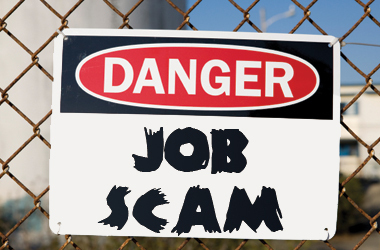by Mylène Kerschner and Barbara Hewitt

Recession, job loss, unemployment, lay-offs: These are all words we’re familiar with in Career Services. Although Penn’s class of 2009 fared well despite the economy (see the career plans survey results here for the College, here for Wharton, here for Nursing, and Engineering will be coming soon), we know many of our current students and alumni are actively searching for employment in what feels like desperate times. While it may be tempting to spring at every opportunity, we urge you to be vigilant. Does the job posting seem too good to be true? It may be. Phishing scams are as popular as ever, and many now are specifically targeted at the job-seeker. Before you submit sensitive information as part of an application, consider the following:
It is always good practice to do some investigative legwork before submitting your application to an employer – whether you’ve found the job through PennLink or Craigslist or on another job board. A good rule of thumb is to go to the company’s website. Check that they actually have a web address, and that the one they’ve given actually matches the URL at the top of the page where you are directed. Also, look at the email where you are asked to send your documents. Does it look like a corporate email or does it appear to be a personal one (gmail, hotmail, etc.)? While sometimes smaller organizations do legitimately use personal emails to receive application materials, it does indicate that you should investigate the opportunity carefully. When you are initially applying, use common sense. If you are uncomfortable providing any of the required information, contact the Career Services office for advice before proceeding.
Here are some good tips that the job is probably a scam:
- You must give your credit card or bank account numbers, or copies of personal documents before you have an interview or are offered the job. This type of personal information is not usually needed until an employer actually hires you.
- You must send payment by wire service or courier.
- You are offered a large payment or reward in exchange for allowing the use of your bank account – often for depositing checks or transferring money.
- You receive an unexpectedly large check.
Watch out for scams trying to take advantage of your employment status, and avoid becoming a victim.
(For more information, CNN also ran a similar story in July 2009. Click here to read the piece by Rachel Zupek.)


